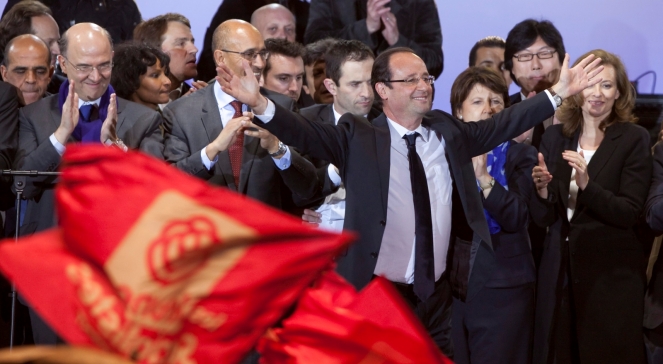
foto: PAP/EPA/IAN LANGSDON
Prof. Roman Kuzniar told reporters this morning Hollande will not radically change French foreign policy.
"Hollande is a very centrist socialist and a convinced European," he said.
Hollande, the Socialist party candidate, received 51.62 percent of the vote in the second round of voting, to Nicolas Sarkozy's 48.38 percent, according to official figures released by France's interior ministry.
Turnout was 81 percent.
This is the first victory by a left wing politician in presidential elections in France in 17 years.
US president Barack Obama has already spoke via telephone with Francois Hollande.
The White House announced that the American president said he looks forward to working with Hollande on a range of shared economic and security issues and invited him to visit Washington before this month's G-8 summit at Camp David.
The UK prime minister, David Cameron also had a telephone call with Hollande, late Sunday night, where he looked “forward to working very closely together in the future and building on the very close relationship that already exists between the UK and France," a Downing Street statement says.
Germany's chancellor, Angela Merkel, a close ally of the outgoing president Nicolas Sarkozy, invited the French president-elect to Berlin for talks, saying she was sure the two could work together.
Hollande, however, has vowed to re-negotiate the anti-austerity EU fiscal pact, which he says should put more emphasis on creating growth in the eurozone and should not just looking at ways to cut debt.
"Europe is watching us. Austerity can no longer be the only option," he told supporters last night.
Chance for Poland?
Janusz Mrowiec, a former Polish ambassador to Algeria and other french speaking countries in Africa, said that Hollande's election could be positive for Poland.
“I think there will be a good atmosphere between Poland and France,” Mrowiec told the TVP public broadcaster.
The former ambassador said that Hollande will try to renew the process of EU integration and try to put a halt to a two-speed Europe.
“We must also reckon with a strengthening of the Weimar Triangle,” he added, referring to the Polish-French-German alliance, which the present government in Warsaw has been keen to see prosper, as a way of increasing Poland's influence within the EU.
Polish presidential advisor in international affairs, Prof. Roman Kuzniar said that he doesn't expect any great changes to the substance of French foreign policy.
There will be “certain changes to the style” of Hollande's presidency, however, which will be “much more sensitive” that Sarkozy's term in office, Kuzniar told TOK FM.
One of the issues that the new French president wants to re-negotiate is the role of the European Central Bank (ECB), a move which Polish finance minister Jacek Rostowski has said Poland would support.
The ECB “still doesn’t have an adequate role as an institution to guarantee cohesion of the [single currency] area,” Mr. Rostowski said the first round of the French presidential elections two weeks ago which saw Hollande receive the largest share of the vote.
“France will not be a factor that breaks the European Union,” former Polish prime minister Tadeusz Mazowiecki said at a debate on democracy in the EU at the Presidential Palace in Warsaw, Monday morning.
“I think that if Francois Hollande will [make efforts] at strengthening economic growth, but not will disassemble financial discipline,” he said.
Leszek Miller, leader of the opposition Democratic Left Alliance (SLD) said last night that Hollande's victory could signal a new surge of support for the left in Europe, where currently 20 centre-right parties rule, including Prime Minister Donald Tusk's Civic Platform in Poland.
Miller, a former prime minister, contrasted the Civic Platform policy, bitterly opposed by opposition parties, of raising the retirement age to 67 years old for both men and women in Poland to pledges by Hollande.
“Not only is it not likely that [Hollande] will increase the retirement age but he wants to freeze it at 60 years,” Miller told the TVN24 news channel.
Hollande has also vowed to create 60,000 new teaching jobs in France and has promised a new stimulus package for the French economy to boost economic growth.
Meanwhile, the Euro, the European single currency which Poland hopes to join in the future, slipped in value against major currencies after the news of the French presidential and Greek parliamentary elections.
The euro fell as low as 1.295 USD, its lowest since January this year.
Austerity parties take poll hit
The anti-austerity Coalition of the Radical Left saw big gains in the Greek elections, at the cost of the ruling New Democracy and Pasok parties, which both signed up to severe debt-management schemes imposed on Athens by the EU and IMF.
Though no party has overall control in the Greek parliament after Sunday's vote, currency traders expressed uncertainty as how a new Greek government would want to re-negotiate its bailout package.
Meanwhile, Angela Merkel's centre-right Christian Democrats lost control in the state of Schleswig-Holstein, Sunday, after a state election.
Social democrats and Greens also failed to win a majority, however, in what will now be a hung state parliament. (pg)